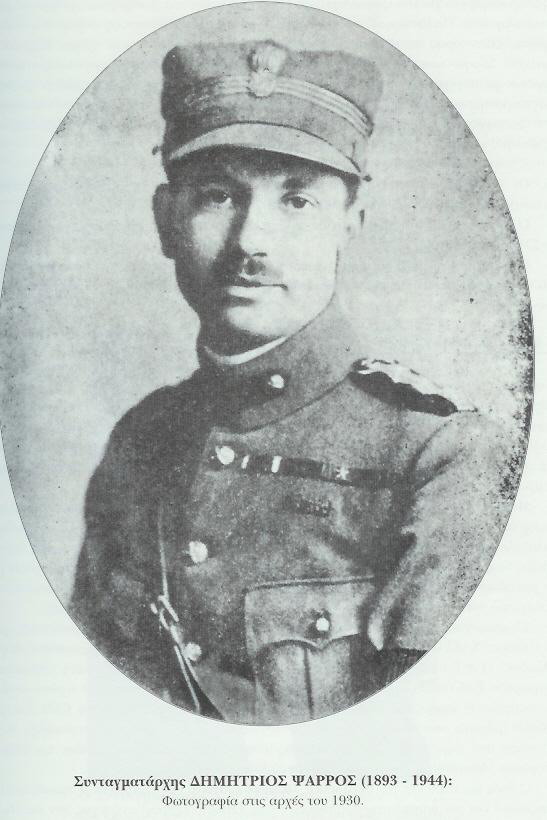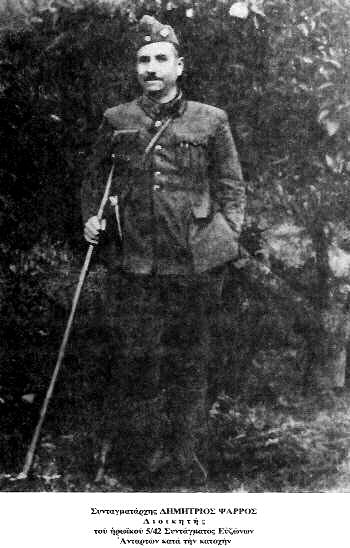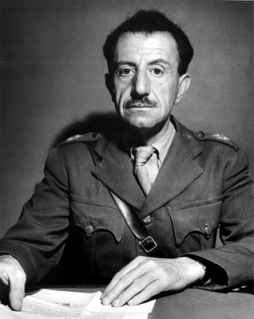<Back to Index>
- Colonel of the Hellenic Army Dimitrios Psarros (Δημήτριος Ψαρρός), 1893
- Officer of the Hellenic Army Stefanos Sarafis (Στέφανος Σαράφης), 1890
PAGE SPONSOR


Dimitrios Psarros (Greek: Δημήτριος Ψαρρός, 1893 – April 17, 1944) was a Greek army officer and resistance leader. He was the founder and leader of the resistance group National and Social Liberation (Greek: Εθνική και Κοινωνική Απελευθέρωσις, EKKA), the third most significant organization of the Greek Resistance movement after the National Liberation Front (EAM) and the National Republican Greek League (EDES).
Psarros was born in 1893 in the village of Chryso, in the province of Parnassida, Phocis. He attended the Greek Army Academy, and in 1916 he graduated as Second Lieutenant of Artillery.
Psarros first saw action in the Balkan Wars as a volunteer, while still being a cadet in the Army Academy. In 1916 he joined the Venizelist National Defense government and fought in the Macedonian front of World War I, in the Allied intervention in the Russian Civil War (in Crimea) as a Captain, where he was injured and in the Greco - Turkish War (1919 - 1922) where, thanks to his bravery, his men were able to pass into Greece from Asia Minor without many casualties. Before the war with the Turks, he was sent to France for superior war studies and after his return from Asia Minor he served in the Staff of the Army of Evros, which played a critical role to Greek strategy and politics during these years. Subsequently he taught in the newly created Greek War Academy. Later, he was among the organizers of the new Ministry of Aviation and served as Chief of Staff of an Army division.
In March 1935 he took part in the failed Venizelist coup d'état. Along with scores of other Venizelist and Republican officers, he was court martialed and dismissed from the Army, opening the way for the royalist Army leadership to restore the Greek monarchy in October. When Greece entered World War II, he sought re-appointment into the armed forces but was refused by the Ioannis Metaxas dictatorship.
Following the collapse of the front through the German invasion of Greece in April 1941 and the onset of a triple occupation by Germany, Italy and Bulgaria, Psarros first attempted to organize a resistance group in Amfissa with the help of Lt. Andreas Mitalas, but without success. Next he went to Macedonia. There, in July 1941, he founded the organization Freedom (Greek: Ελευθερία, Eleftheria), which deployed guerilla forces in the area of Nigrita, Lachana and Kalokastro of Central Macedonia, to fight the Bulgarians, who had followed the Germans into Greece, occupied much of northern Greece and had set their sights on permanent annexation. Unfortunately, Psarros was betrayed to the Axis Forces and was chased by them.
He fled to Athens, where in April 1942 he founded EKKA along with other significant figures such as the politician Georgios Kartalis, Colonel Evripidis Bakirtzis and other army officers like Dimitrios Karachristos and Dimitrios Georgantas. The organization's aims were to fight the Axis occupation forces as long as the occupation lasted and, after liberation, work for social change, in a social democratic direction. EKKA was also an anti - communist, liberal and Venizelist organisation. EKKA soon fielded its own guerrilla forces, named after the famed 5/42 Evzone Regiment and took action mainly in Central Greece, in the area of Mount Gkiona, but its forces were of small size (around 1,000 fighters at its peak) in comparison to the size of ELAS (with 50,000 fighters at its peak) and EOEA (military arm of EDES, about 14,000 fighters).
On Easter Monday, April 17, 1944, the 5/42 Regiment was attacked by the forces of ELAS (controlled by the Communist Party of Greece), who sought to have a monopoly in the political future of Greece after liberation, to disarm EKKA and further strengthen its dominant military and political position after the anticipated liberation of Greece. Colonel Psarros was captured, shot, stabbed and beheaded. His body lay unburied for several days before it was interred at the local cemetery.
The assassination of Colonel Psarros was a very dark point of Greek
Resistance era. Psarros was a very capable and educated officer, a man
of honor and value. People of all resistant groups were shocked by the
announcement of his death. In 1945 he was promoted posthumously by the
Hellenic Army tο the rank of Major General.

Stefanos Sarafis (Greek: Στέφανος Σαράφης, 1890 - 31 May 1957) was an officer of the Hellenic Army who played an important role during the Greek Resistance.
Sarafis was born at Trikala in 1890, and studied law in the University of Athens. During the Balkan Wars, he enlisted in the Greek Army as a sergeant, and was promoted to lieutenant in 1913. He became a Venizelist, and played an active role in the various military conspiracies that were formed during the troubled 1920s. He participated in the two failed Venizelist coup attempts of 1933 and 1935. The latter was led by Nikolaos Plastiras and intended to overthrow the government of Prime Minister Panagis Tsaldaris. The failure of the coup resulted in the execution of its leader for treason and dishonorable discharges for several of the participants. Sarafis himself was condemned to life imprisonment, but was pardoned by the government.
Sarafis was exiled to the island of Milos which was populated but had no connection to military activities. He was thus effectively isolated from possible contacts with active Army members. In 1938, Sarafis was introduced to Marion Pascoe, an English student of the University of Oxford who visited the island to pursue her studies of archaeology. However her limited knowledge of the Greek language prevented her from effectively communicating with the locals.
Sarafis was reportedly the only person on the island with working knowledge of the English language and volunteered to help her in communicating. Their private conversations over political beliefs and the History of Greece resulted in her lifelong interest in Greek matters. Marion later claimed to have fallen in love with Sarafis at this point.
Marion left Greece during the Greco - Italian War. Sarafis resurfaced as a leading figure of the Greek Resistance movement. Initially in contact with the republican EDES and EKKA movements, in March 1943 he was arrested by guerillas of the communist EAM - National People's Liberation Army (ELAS). Despite his background, a month later Sarafis joined ELAS. His motives for this have been hotly contested, but he seems to have been impressed by ELAS' strength and at least partly sympathized with its political aims. In May, he was appointed as head of its general staff. From this position he played a crucial role during the Dekemvriana.
After the military and political defeat of EAM in the Dekemvriana, he was captured and exiled to Serifos
where Marion re-established correspondence with him in 1946. She had
joined the League for Democracy which campaigned for the release of political prisoners.
Sarafis was eventually released in 1948 and married Marion in 1952. He joined the United Democratic Left at about this time. In the Greek legislative election, 1956, the United Democratic Left entered a coalition with the Republican Union, the Liberal Party (EP), the Rally of the Farmers and the Workers, National Progressive Union of the Center and the Democratic Socialist Party. The coalition came second and managed to elect 132 MPs. Sarafis was among them.
He was a pedestrian casualty in a car accident on 31 May 1957 in Alimos, a suburb of Athens. He and his wife Marion were taking a walk when an automobile driven by a non - commissioned officer of the United States Air Force collided with them. Sarafis was killed and his wife injured.
George V. Allen, the then United States Ambassador to Greece, ordered the airman to be handed to the Greek authorities for trial. The airman admitted to have been driving under the influence and having violated the speed limit. He was charged with manslaughter. However fellow politicians of the United Democratic Left strongly suspected the incident to be a "premeditated murder" and reported their suspicions to the press.